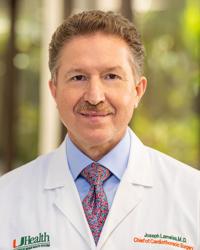
Joseph Lamelas, MD
University of Miami Health System, Miller School of Medicine
Chief of Cardiac Surgery and Pioneer of the Minimally Invasive Approach to Cardiac Surgery
Expertise:
Cardiac SurgeryCardiac SurgeryHeart HealthHeart Healthminimally invasive cardiac surgeryminimally invasive cardiac surgery
Dr. Lamelas is considered an expert and pioneer in the most advanced forms of minimally invasive cardiac surgery. He is board certified in cardiac and thoracic surgery and has received board certification in surgery and surgical critical care. He consistently achieves one of the lowest morbidity and mortality rates in the State of Florida, as well as in the nation, gaining the attention of surgeons and patients from around the globe. Dr. Lamelas completed his general surgery residency at The Brooklyn Hospital Center in Brooklyn, New York, and his cardiovascular and thoracic surgery residency at The State University of New York Health Science Center in Brooklyn, New York. Dr. Lamelas has performed more than 17,000 cardiac operations – more than 7,000 of which have employed a minimally invasive approach - throughout his career, which began in 1990. Dr. Lamelas has also trained over 1,000 cardiac surgeons around the world on how to employ a minimally invasive approach in cardiac surgery. Because of his extensive experience, Dr. Lamelas has played an instrumental role in the design and development of new and innovative techniques, concepts, and products for advancing the field of minimally invasive cardiac surgery. Dr. Lamelas pioneered the "Miami Method” a minimally invasive valve repair and replacement approach that has been documented to benefit patients. Minimally invasive cardiac surgery results in less physical pain and trauma, less blood loss, reduced risk of infection, shorter hospital stays, quicker recuperation, and better long-term outcomes than more traditional cardiac surgical procedures. In addition, research conducted by Dr. Lamelas demonstrates high-risk patients – including the elderly, obese, those with chronic lung diseases, such as COPD, and kidney disease – who are too frail for traditional open-chest operations are better able to withstand a minimally invasive cardiac surgery. Dr. Lamelas is fluent in both English and Spanish.
No Research/Citations

University of Miami Health System Recognized as a Mitral Valve Repair Reference Center
The University of Miami Health System has received the Mitral Valve Repair Reference Center Award from the American Heart Association and the Mitral Foundation for a demonstrated record of superior clinical outcomes resulting from evidence-based, guideline-directed degenerative mitral valve repair.
10-Dec-2021 09:40:17 AM EST

Innovative Mitral Valve Replacement Procedure Shows Promise for High-Risk Patients in Miller School Study
An innovative mitral valve replacement procedure shows promise for high-risk patients in a new University of Miami Miller School of Medicine study led by Joseph Lamelas, M.D., chief and program director of cardiothoracic surgery.
29-Jan-2021 07:45:47 AM EST

Minimally Invasive Aortic Valve Replacement Risks Are Overestimated, Miller School Study Finds
Minimally invasive aortic valve replacement surgery is a safer procedure than indicated by current surgical risk scores, according to a study published in Innovations, the journal of the International Society for Minimally Invasive Cardiothoracic Surgery, led by Joseph Lamelas, M.D., chief and program director of cardiothoracic surgery at the University of Miami Health System.
26-Jan-2021 04:05:14 PM EST

Two approaches used to protect the brain during aortic aneurysm repair are equally effective and safe
Two commonly used approaches to protect the brain during surgery to repair an ascending aortic aneurysm are equally effective, according to a review by University of Miami Miller School of Medicine researchers published October 6 in the Journal of Cardiac Surgery.
Dr. Joseph Lamelas, pioneer of the minimally invasive approach to cardiac surgery, authors study.
22-Oct-2020 02:35:29 PM EDT
The minimally invasive approach is the least traumatic of all operations. Few require blood products afterward, and both the recovery in the hospital and return to a normal lifestyle are a lot quicker than any other operations.
-
Minimally invasive cardiac surgery results in less physical pain and trauma, less blood loss, reduced risk of infection, shorter hospital stays, quicker recuperation, and better long-term outcomes than more traditional cardiac surgical procedures.
-